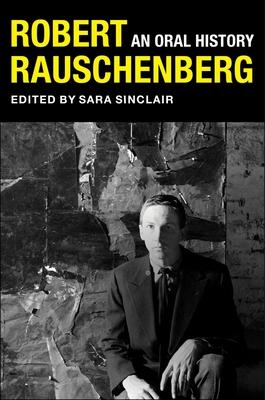Robert Rauschenberg (1925-2008) was a breaker of boundaries and a consummate collaborator. He used silk-screen prints to reflect on American promise and failure, melded sculpture and painting in works called combines, and collaborated with engineers and scientists to challenge our thinking about art. Through collaborations with John Cage, Merce Cunningham, and others, Rauschenberg bridged the music, dance, and visual-art worlds, inventing a new art for the last half of the twentieth century.
Robert Rauschenberg is a work of collaborative oral biography that tells the story of one of the twentieth century’s great artists through a series of interviews with key figures in his life--family, friends, former lovers, professional associates, studio assistants, and collaborators. The oral historian Sara Sinclair artfully puts the narrators’ reminiscences in conversation, with a focus on the relationship between Rauschenberg’s intense social life and his art. The book opens with a prologue by Rauschenberg’s sister and then shifts to New York City’s 1950s and ’60s art scene, populated by the luminaries of abstract expressionism. It follows Rauschenberg’s eventual move to Florida’s Captiva Island and his trips across the globe, illuminating his inner life and its effect on his and others’ art. The narrators share their views on Rauschenberg’s work, explore the curatorial thinking behind exhibitions of his art, and reflect on the impact of the influx of money into the contemporary art market. Included are artists famous in their own right, such as Laurie Anderson and Brice Marden, as well as art-world insiders and lesser-known figures who were part of Rauschenberg’s inner circle. Beyond considering Rauschenberg as an artist, this book reveals him as a man embedded in a series of art worlds over the course of a long and rich life, demonstrating the complex interaction of business and personal, public and private in the creation of great art.| FindBook |
有 1 項符合
Robert Rauschenberg: An Oral History的圖書 |
 |
Robert Rauschenberg: An Oral History 出版社:Columbia University Press 出版日期:2021-03-30 語言:英文 規格:平裝 / 328頁 / 普通級/ 初版 |
| 圖書館借閱 |
| 國家圖書館 | 全國圖書書目資訊網 | 國立公共資訊圖書館 | 電子書服務平台 | MetaCat 跨館整合查詢 |
| 臺北市立圖書館 | 新北市立圖書館 | 基隆市公共圖書館 | 桃園市立圖書館 | 新竹縣公共圖書館 |
| 苗栗縣立圖書館 | 臺中市立圖書館 | 彰化縣公共圖書館 | 南投縣文化局 | 雲林縣公共圖書館 |
| 嘉義縣圖書館 | 臺南市立圖書館 | 高雄市立圖書館 | 屏東縣公共圖書館 | 宜蘭縣公共圖書館 |
| 花蓮縣文化局 | 臺東縣文化處 |
|
|
圖書介紹 - 資料來源:博客來 評分:
圖書名稱:Robert Rauschenberg: An Oral History
內容簡介
作者簡介
Sara Sinclair was project manager and lead interviewer for the Robert Rauschenberg Oral History Project at the Columbia Center for Oral History Research.
Peter Bearman is Jonathan R. Cole Professor of Social Science and director of the Interdisciplinary Center for Innovative Theories and Empirics at Columbia University. He is the author of Doormen (2005) and coauthor of Working for Respect: Community and Conflict at Walmart (Columbia, 2018). Mary Marshall Clark is director of the Columbia Center for Oral History Research and cofounding director, with Peter Bearman, of the Oral History Master of Arts Program at Columbia University. She is coeditor of After the Fall: New Yorkers Remember September 2001 and the Years That Followed (2011) and coeditor of the Columbia Oral History Series.
|










